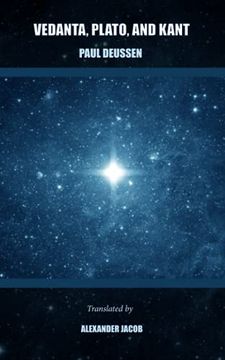Compartir
Vedanta, Plato, and Kant (Translated) (en Inglés)
Paul Deussen (Autor)
·
Manticore Press
· Tapa Blanda
Vedanta, Plato, and Kant (Translated) (en Inglés) - Paul Deussen
$ 7.06
$ 8.95
Ahorras: $ 1.89
Elige la lista en la que quieres agregar tu producto o crea una nueva lista
✓ Producto agregado correctamente a la lista de deseos.
Ir a Mis ListasSe enviará desde nuestra bodega entre el
Viernes 31 de Mayo y el
Lunes 03 de Junio.
Lo recibirás en cualquier lugar de Estados Unidos entre 1 y 3 días hábiles luego del envío.
Reseña del libro "Vedanta, Plato, and Kant (Translated) (en Inglés)"
"The Kantian worldview, which always underlay all religion, philosophy, and art, could not have been the eternal truth if it did not emerge more or less clearly everywhere that the human mind penetrated into the depths, as this occurred, for example, in India through the Upanishads of the Vedas and the Vedanta based on them and in Greece through Parmenides and Plato. To consider both these phenomena in the light of the Kantian philosophy is the task that we have set ourselves here." - Paul Deussen Vedanta, Plato, and Kant is a new translation. The book presents a defense of Shankara's Advaita Vedānta philosophy as well as an elucidation of the Greek Idealistic doctrines of Parmenides and Plato. In all these schools of thought, Deussen detects a similar basic understanding of the world as a mere appearance distinct from Ideal Reality. He approximated this understanding to the Kantian notion of 'things in themselves' (Dinge-an-sich) and noted a degeneration of the original Vedic and Upanishadic worldview in the philosophies that followed, such as the Sāmkhya and Buddhism, just as there was a corruption of Parmenides' doctrine of Being in the philosophy of his pupil Zeno. Similarly, he believes that Kant's revolutionary Idealistic insights in Germany were also distorted by the post-Kantian thinkers and not generally understood in their original form except by Arthur Schopenhauer (1788-1860), who developed the doctrine of the world as a mere representation produced by the innate intuitive forms within the Intellect - Space, Time, and Causality.Includes a preface by Alexander Jacob (Translator)
- 0% (0)
- 0% (0)
- 0% (0)
- 0% (0)
- 0% (0)
Todos los libros de nuestro catálogo son Originales.
El libro está escrito en Inglés.
La encuadernación de esta edición es Tapa Blanda.
✓ Producto agregado correctamente al carro, Ir a Pagar.

